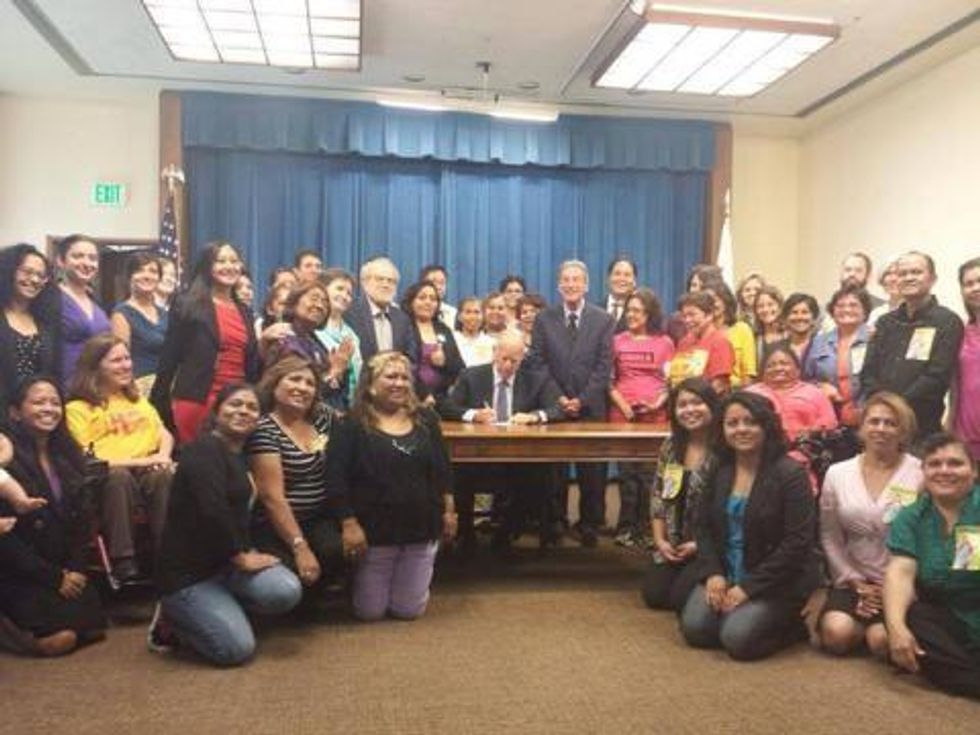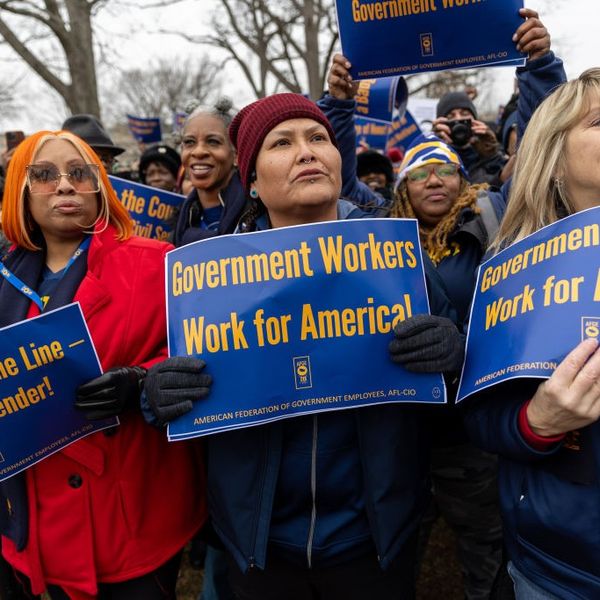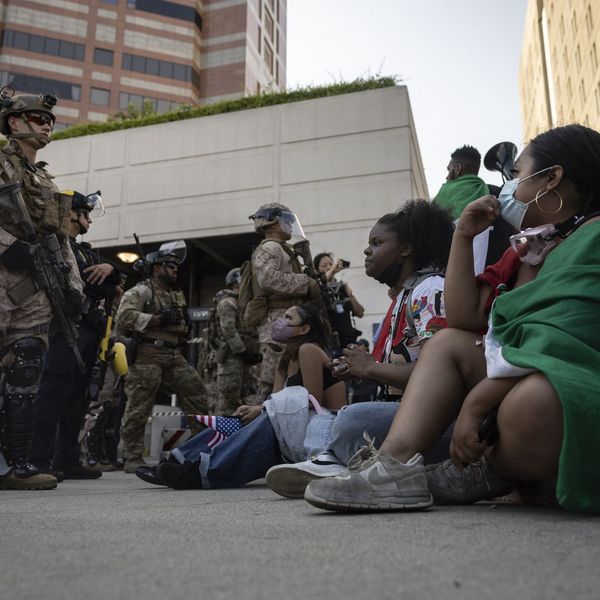California Governor Signs Domestic Worker Bill of Rights
Early Thursday afternoon on the West Coast, Governor Jerry Brown tweeted a message:

"Today, I signed a bill to help California's domestic workers."
Just sixty characters, the governor's announcement brought Ai Jen Poo, executive director of the National Domestic Workers Alliance to tears:
"Cannot stop crying tears of joy & pride. After 7 years of hard work & two vetoes, finally a victory for domestic workers in CA", tweeted Poo.
The California Domestic Worker Bill of Rights will make California the third state in the nation with a bill of rights for domestic workers. (A similar law took effect in New York State in November 2010. Hawaii's Governor Abercrombie signed a domestic workers bill of rights this summer.) Enforcement is always an issue, but should it be implemented as intended, California's new law will finally provide overtime pay to an estimated 200,000 California housekeepers, child care providers and caregivers when they work more than 9 hours in a day or forty-five hours a week.
"Domestic workers are primarily women of color, many of them immigrants, and their work has not been respected in the past," said Assemblyman Tom Ammiano (D-San Francisco), who wrote the bill. "Now, they will be entitled to overtime, like just about every other California working person."
A slightly broader version of Ammiano's bill passed last year only to be vetoed by the Governor. What made the difference?
"Last year was hard. Getting up the next day was really difficult" said Laphonza Butler, president of the SEIU United Long Term Care Workers, about the governor's veto last September. The SEIU ULCW was part of the broad coalition that worked with the National Domestic Workers Alliance and the California Domestic Workers Coalition both years. This year's bill was known as AB 241.
For all the tweeting on announcement day, it wasn't short-form social media so much as hard-slog footwork and long-term coalition building that turned things around in 2013, Butler said.
"What made the difference was a lot of community and worker activity that made the governor realize we've got to do something about an economy that keeps workers in poverty."
Finances came in too. A year ago, Governor Brown was focused on solving the state's deficit. Frustrated as they were by the vetoing of their bill, the coalition behind the Domestic Workers Bill of Rights put their person-power behind passing Proposition 30. Officially, "Temporary Taxes to Fund Education" Proposition 30--to increase taxes--was approved by California voters by a margin of 55 to 45 percent in November 2012.
"The work that the coalition did on passing Prop 30, created better revenue for the state and that opened up space for the Governor to think about other issues," said Butler.
The domestic workers' bill was also weakened. Stripped out of Ammiano's 2012 version were meal and rest breaks and part-time babysitters.
A federal ruling providing minimum wage and overtime to home healthcare workers was announced last week.
For why passage of AB 241 is such a big deal, see what Ai Jen Poo and Lourdes Balagot-Pablo, a California home health worker had to tell me when we talked at the AFL-CIO convention in Los Angeles earlier this month. Or take it from comedian Amy Poehler, one of the many celebrities that got behind the campaign.
Notable among the bravos flying around the twitter-sphere immediately after Governor Brown's message was one from Hand in Hand, a domestic worker's employers' group: "Employers join domestic workers in celebrating!!!!! Yes we did!!!"
Butler praised the governor, the legislators who were willing to take up the bill and push it a second time, and the workers in two states:
"Getting up and dusting oneself off [after defeat]. There's nothing harder than that, but the voice of those workers said to all of us that we didn't have a choice, that we had to move and go at this one more time. The success we all saw in New York, that gave us the hope that this actually could be done. "
For her part Poo (reached after her tears had dried), praised the organizers: "I'm just so proud of our members and organizers in California who--from a statewide caravan to cookies--ran such a fantastic campaign. It's a testament to the dedication and incredible capacity of the women."
Watch out Massachusetts, Poo says that state's next.
Today's bill contains a three-year sunset provision: a committee will be set up to review the success of the bill, and lawmakers would have three years to make it permanent.
An Urgent Message From Our Co-Founder
Dear Common Dreams reader, The U.S. is on a fast track to authoritarianism like nothing I've ever seen. Meanwhile, corporate news outlets are utterly capitulating to Trump, twisting their coverage to avoid drawing his ire while lining up to stuff cash in his pockets. That's why I believe that Common Dreams is doing the best and most consequential reporting that we've ever done. Our small but mighty team is a progressive reporting powerhouse, covering the news every day that the corporate media never will. Our mission has always been simple: To inform. To inspire. And to ignite change for the common good. Now here's the key piece that I want all our readers to understand: None of this would be possible without your financial support. That's not just some fundraising cliche. It's the absolute and literal truth. We don't accept corporate advertising and never will. We don't have a paywall because we don't think people should be blocked from critical news based on their ability to pay. Everything we do is funded by the donations of readers like you. Will you donate now to help power the nonprofit, independent reporting of Common Dreams? Thank you for being a vital member of our community. Together, we can keep independent journalism alive when it’s needed most. - Craig Brown, Co-founder |

"Today, I signed a bill to help California's domestic workers."
Just sixty characters, the governor's announcement brought Ai Jen Poo, executive director of the National Domestic Workers Alliance to tears:
"Cannot stop crying tears of joy & pride. After 7 years of hard work & two vetoes, finally a victory for domestic workers in CA", tweeted Poo.
The California Domestic Worker Bill of Rights will make California the third state in the nation with a bill of rights for domestic workers. (A similar law took effect in New York State in November 2010. Hawaii's Governor Abercrombie signed a domestic workers bill of rights this summer.) Enforcement is always an issue, but should it be implemented as intended, California's new law will finally provide overtime pay to an estimated 200,000 California housekeepers, child care providers and caregivers when they work more than 9 hours in a day or forty-five hours a week.
"Domestic workers are primarily women of color, many of them immigrants, and their work has not been respected in the past," said Assemblyman Tom Ammiano (D-San Francisco), who wrote the bill. "Now, they will be entitled to overtime, like just about every other California working person."
A slightly broader version of Ammiano's bill passed last year only to be vetoed by the Governor. What made the difference?
"Last year was hard. Getting up the next day was really difficult" said Laphonza Butler, president of the SEIU United Long Term Care Workers, about the governor's veto last September. The SEIU ULCW was part of the broad coalition that worked with the National Domestic Workers Alliance and the California Domestic Workers Coalition both years. This year's bill was known as AB 241.
For all the tweeting on announcement day, it wasn't short-form social media so much as hard-slog footwork and long-term coalition building that turned things around in 2013, Butler said.
"What made the difference was a lot of community and worker activity that made the governor realize we've got to do something about an economy that keeps workers in poverty."
Finances came in too. A year ago, Governor Brown was focused on solving the state's deficit. Frustrated as they were by the vetoing of their bill, the coalition behind the Domestic Workers Bill of Rights put their person-power behind passing Proposition 30. Officially, "Temporary Taxes to Fund Education" Proposition 30--to increase taxes--was approved by California voters by a margin of 55 to 45 percent in November 2012.
"The work that the coalition did on passing Prop 30, created better revenue for the state and that opened up space for the Governor to think about other issues," said Butler.
The domestic workers' bill was also weakened. Stripped out of Ammiano's 2012 version were meal and rest breaks and part-time babysitters.
A federal ruling providing minimum wage and overtime to home healthcare workers was announced last week.
For why passage of AB 241 is such a big deal, see what Ai Jen Poo and Lourdes Balagot-Pablo, a California home health worker had to tell me when we talked at the AFL-CIO convention in Los Angeles earlier this month. Or take it from comedian Amy Poehler, one of the many celebrities that got behind the campaign.
Notable among the bravos flying around the twitter-sphere immediately after Governor Brown's message was one from Hand in Hand, a domestic worker's employers' group: "Employers join domestic workers in celebrating!!!!! Yes we did!!!"
Butler praised the governor, the legislators who were willing to take up the bill and push it a second time, and the workers in two states:
"Getting up and dusting oneself off [after defeat]. There's nothing harder than that, but the voice of those workers said to all of us that we didn't have a choice, that we had to move and go at this one more time. The success we all saw in New York, that gave us the hope that this actually could be done. "
For her part Poo (reached after her tears had dried), praised the organizers: "I'm just so proud of our members and organizers in California who--from a statewide caravan to cookies--ran such a fantastic campaign. It's a testament to the dedication and incredible capacity of the women."
Watch out Massachusetts, Poo says that state's next.
Today's bill contains a three-year sunset provision: a committee will be set up to review the success of the bill, and lawmakers would have three years to make it permanent.

"Today, I signed a bill to help California's domestic workers."
Just sixty characters, the governor's announcement brought Ai Jen Poo, executive director of the National Domestic Workers Alliance to tears:
"Cannot stop crying tears of joy & pride. After 7 years of hard work & two vetoes, finally a victory for domestic workers in CA", tweeted Poo.
The California Domestic Worker Bill of Rights will make California the third state in the nation with a bill of rights for domestic workers. (A similar law took effect in New York State in November 2010. Hawaii's Governor Abercrombie signed a domestic workers bill of rights this summer.) Enforcement is always an issue, but should it be implemented as intended, California's new law will finally provide overtime pay to an estimated 200,000 California housekeepers, child care providers and caregivers when they work more than 9 hours in a day or forty-five hours a week.
"Domestic workers are primarily women of color, many of them immigrants, and their work has not been respected in the past," said Assemblyman Tom Ammiano (D-San Francisco), who wrote the bill. "Now, they will be entitled to overtime, like just about every other California working person."
A slightly broader version of Ammiano's bill passed last year only to be vetoed by the Governor. What made the difference?
"Last year was hard. Getting up the next day was really difficult" said Laphonza Butler, president of the SEIU United Long Term Care Workers, about the governor's veto last September. The SEIU ULCW was part of the broad coalition that worked with the National Domestic Workers Alliance and the California Domestic Workers Coalition both years. This year's bill was known as AB 241.
For all the tweeting on announcement day, it wasn't short-form social media so much as hard-slog footwork and long-term coalition building that turned things around in 2013, Butler said.
"What made the difference was a lot of community and worker activity that made the governor realize we've got to do something about an economy that keeps workers in poverty."
Finances came in too. A year ago, Governor Brown was focused on solving the state's deficit. Frustrated as they were by the vetoing of their bill, the coalition behind the Domestic Workers Bill of Rights put their person-power behind passing Proposition 30. Officially, "Temporary Taxes to Fund Education" Proposition 30--to increase taxes--was approved by California voters by a margin of 55 to 45 percent in November 2012.
"The work that the coalition did on passing Prop 30, created better revenue for the state and that opened up space for the Governor to think about other issues," said Butler.
The domestic workers' bill was also weakened. Stripped out of Ammiano's 2012 version were meal and rest breaks and part-time babysitters.
A federal ruling providing minimum wage and overtime to home healthcare workers was announced last week.
For why passage of AB 241 is such a big deal, see what Ai Jen Poo and Lourdes Balagot-Pablo, a California home health worker had to tell me when we talked at the AFL-CIO convention in Los Angeles earlier this month. Or take it from comedian Amy Poehler, one of the many celebrities that got behind the campaign.
Notable among the bravos flying around the twitter-sphere immediately after Governor Brown's message was one from Hand in Hand, a domestic worker's employers' group: "Employers join domestic workers in celebrating!!!!! Yes we did!!!"
Butler praised the governor, the legislators who were willing to take up the bill and push it a second time, and the workers in two states:
"Getting up and dusting oneself off [after defeat]. There's nothing harder than that, but the voice of those workers said to all of us that we didn't have a choice, that we had to move and go at this one more time. The success we all saw in New York, that gave us the hope that this actually could be done. "
For her part Poo (reached after her tears had dried), praised the organizers: "I'm just so proud of our members and organizers in California who--from a statewide caravan to cookies--ran such a fantastic campaign. It's a testament to the dedication and incredible capacity of the women."
Watch out Massachusetts, Poo says that state's next.
Today's bill contains a three-year sunset provision: a committee will be set up to review the success of the bill, and lawmakers would have three years to make it permanent.

